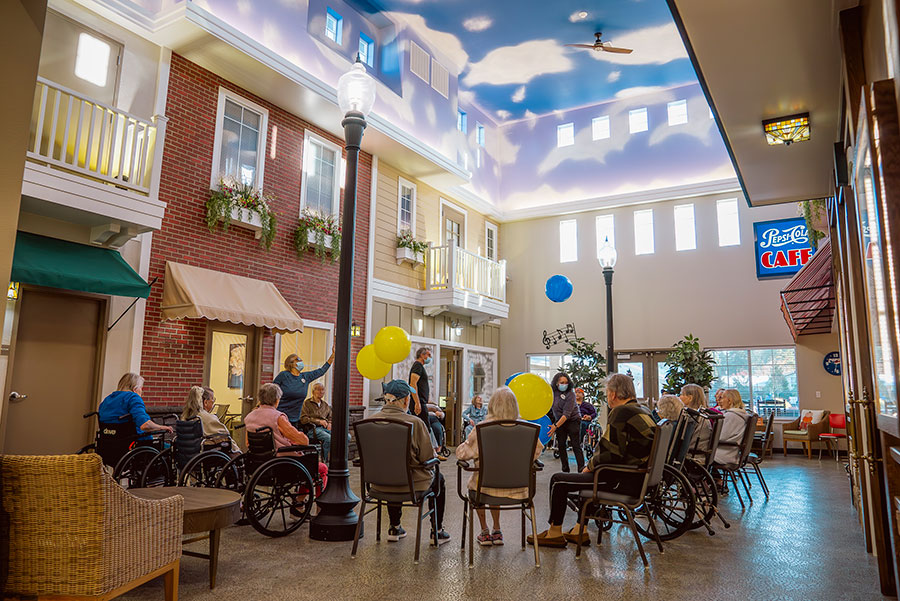Personalized Memory Care Options Focused on Personal Requirements
Personalized Memory Care Options Focused on Personal Requirements
Blog Article
Everything About Memory Care Solutions: Why Little Memory Treatment Houses Are a Great Choice
Memory treatment services play a vital role in sustaining individuals with Alzheimer's and mental deterioration. Little memory care homes stick out for their tailored technique and intimate setup. With lower staff-to-resident ratios, these homes foster more powerful connections and customized treatment. Locals benefit from boosted social communications and a safe atmosphere. As families check out choices, understanding the unique benefits of tiny memory treatment homes becomes essential. What variables should be considered when picking the best home?
Comprehending Memory Care Provider
While numerous may recognize with general senior treatment options, comprehending memory care solutions is important for families facing the obstacles of cognitive decline. Memory treatment especially deals with individuals with problems such as Alzheimer's condition and other types of dementia. These solutions give an organized atmosphere that concentrates on boosting the lifestyle for locals with specialized care and support.Memory care centers are created to guarantee security and protection, often including secured atmospheres to protect against roaming. Trained employee are offered all the time to aid with everyday tasks, drug management, and individual treatment. Furthermore, memory care programs usually include cognitive excitement tasks, customized to engage homeowners and promote mental health. Families can profit from recognizing these services, as they enable informed choices regarding their enjoyed ones' care, guaranteeing that their specific demands and preferences are addressed in a compassionate and helpful fashion.
The Benefits of Small Memory Care Homes
Little memory care homes use distinct benefits that can considerably improve the lifestyle for citizens with cognitive disabilities. One significant benefit is the intimate environment, which enables customized communications among staff and residents. This smaller sized setting cultivates significant connections, minimizing sensations of seclusion and stress and anxiety commonly experienced by people with memory issues.Additionally, the reduced staff-to-resident proportion in tiny memory care homes enables caregivers to provide more alert supervision and assistance. This technique not just improves security however also advertises a complacency for the residents.Moreover, tiny memory treatment homes can adjust quickly to the distinct demands and choices of each local, permitting a much more homey ambience. Such an environment can urge social interaction and involvement in activities, eventually enriching the day-to-day experiences of those coping with cognitive impairments.
Personalized Care Program for Homeowners
Individualized care plans are important in memory care homes, as they provide to the one-of-a-kind demands and choices of each local. These plans start with thorough evaluations conducted by competent experts, that examine cognitive capacities, medical background, and personal passions. This tailored approach guarantees that care is not only reliable yet also considerate of each person's self-respect and autonomy.Moreover, personalized care plans are adaptable, enabling adjustments as homeowners' needs evolve with time. This adaptability promotes a sense of safety and security and knowledge, which is essential for people living with memory difficulties. Caretakers are trained to apply these strategies consistently, offering assistance that straightens with the homeowners' regimens and preferences.Ultimately, personalized care strategies improve the top quality of life for homeowners by promoting well-being, independence, and engagement, making them a fundamental aspect of memory care services in tiny memory treatment homes.
Producing a Home-Like Atmosphere
Developing a home-like setting is vital for promoting comfort and familiarity in memory care setups, as it greatly impacts residents' psychological health. Tiny memory care homes often focus on individualized touches, such as warm color schemes, household photos, and acquainted furnishings plans, which aid citizens feel a lot more secure. Incorporating components similar to a traditional home, like comfy space and common areas, urges a sense of belonging.Moreover, making use of all-natural light and outdoor rooms can enhance the ambience, promoting leisure and serenity. Personnel play a significant function in keeping this environment by engaging with citizens in a compassionate fashion, treating them like family members. Regular tasks, such as food preparation or gardening, can additionally add to a home-like feel, supplying opportunities for residents to take part in significant experiences. Overall, producing a supporting atmosphere sustains cognitive function and emotional security, making it an important element of memory treatment solutions.
Improved Social Communication and Area
Boosted social interaction and community are necessary components of memory care solutions. By promoting individualized social interaction and developing a family-like atmosphere, these services promote significant connections among citizens. Team tasks and occasions even more motivate engagement, aiding individuals feel a lot more consisted of and sustained.
Individualized Social Involvement
While social communication is necessary for general wellness, lots of people with memory problems usually struggle to involve meaningfully with others. Customized social interaction in memory care homes addresses this challenge by producing tailored activities that cater to residents' one-of-a-kind rate of interests and abilities. By concentrating on specific preferences, caretakers can promote connections that resonate deeply with everyone. Activities such as art therapy, songs sessions, and directed discussions promote cognitive excitement and emotional expression. Additionally, tiny team settings urge sociability and permit more intimate communications, boosting sensations of belonging. This approach not just battles sensations of isolation but also encourages citizens to maintain a feeling of identity, eventually contributing to boosted mental health and lifestyle.
Family-like Atmosphere
In a memory treatment setup, fostering a family-like ambience greatly boosts social interaction and builds a sense of neighborhood amongst homeowners. Smaller sized memory care homes commonly prioritize intimate settings, enabling homeowners to develop closer connections with each other and employee. This nurturing ambience promotes trust fund, which is vital for individuals with memory problems. Locals are more probable to talk and share experiences, developing a supportive network that eases sensations of loneliness. The experience of common spaces and regimens contributes to a feeling of belonging, better encouraging social interaction (personalized memory care). In such setups, psychological bonds grow, resulting in enhanced total well-being and a better of life for citizens as they navigate their everyday experiences together
Group Activities and Events

Security and Safety And Security Functions in Little Homes
Numerous small homes designed for memory care incorporate essential security and safety and security functions to assure the wellness of locals. These homes often make use of safe entry and leave indicate avoid straying, a typical concern amongst individuals with memory impairments. Additionally, surveillance systems and alarm system devices enhance monitoring, guaranteeing that personnel can immediately reply to any type of unusual activities.Interior formats are customized for safety, with decreased threats such as clutter-free paths and sharp corners. Handrails and non-slip floor covering are normally mounted to minimize the threat of falls. Personnel members are Get More Information educated in emergency protocols, guaranteeing they are planned for various situations.Moreover, personalized treatment strategies might consist of analysis of private safety requirements, offering tailored remedies for each and every local. Generally, these safety and security and safety attributes create a nurturing atmosphere where locals can flourish while keeping their dignity and freedom.
How to Pick the Right Memory Care Home
How can families assure they choose the most appropriate memory care home for their enjoyed ones? The decision calls visit for cautious factor to consider of a number of factors. Initially, family members should examine the center's staff credentials and training, making certain that caregivers are experienced in managing memory-related conditions. Next, it's important to examine the home's setting, concentrating on safety functions and whether it promotes a feeling of area and belonging. Visiting the facility can provide understanding right into daily activities and the social atmosphere, which are necessary for psychological stimulation and emotional health. In addition, family members ought to ask about the care plans provided, guaranteeing they are customized to specific demands. Taking into consideration the home's location and accessibility for family gos to can contribute to a smoother shift. By resolving these elements, families can make an enlightened decision that prioritizes their enjoyed one's comfort and quality of life in a memory treatment setting.
Frequently Asked Inquiries
What Credentials Should Team Members in Memory Care Houses Have?
Staff participants in memory care homes must possess pertinent certifications, experience in mental deterioration treatment, solid communication skills, and concern. Continuous training in behavior administration and healing treatments enhances their ability to sustain citizens effectively.
Just How Do Memory Care Solutions Differ From Traditional Assisted Living?
Memory treatment services focus specifically on people with memory impairments, giving specific assistance and organized settings. On the other hand, traditional assisted living offers basic support with day-to-day activities, lacking the customized technique needed for those with cognitive difficulties.
What Sorts of Tasks Are Provided in Memory Treatment Homes?
Memory treatment homes commonly provide a range of tasks developed to involve locals. Usual choices consist of art treatment, songs sessions, cognitive video games, physical exercises, gardening, and get-togethers, all intended at enhancing well-being and cognitive function.
Can Locals Bring Their Own Belongings to Memory Care Residences?
Locals can usually bring their own personal belongings to memory care homes, permitting them to individualize their living area - personalized memory care. This practice helps create a familiar atmosphere, promoting convenience and a sense of identification for the people

How Are Family Participants Associated With the Treatment Refine?
Member of the family play an important duty in the care process, typically joining decision-making, participating in treatment conferences, and supplying emotional assistance. Their participation fosters a joint setting, enhancing the citizen's overall well-being and lifestyle. While several might be familiar with general elderly care alternatives, comprehending memory care solutions is vital for households encountering the obstacles of cognitive decline. These solutions supply a structured setting that concentrates on enhancing the quality of life for locals through specialized treatment and support.Memory care facilities Full Article are made to ensure security and safety and security, frequently including safeguarded atmospheres to prevent straying. Personalized treatment plans are essential in memory care homes, as they cater to the one-of-a-kind requirements and choices of each citizen. Team participants in memory treatment homes should have appropriate qualifications, experience in mental deterioration care, strong interaction abilities, and compassion. Memory treatment services focus specifically on people with memory impairments, supplying specialized assistance and structured atmospheres.
Report this page